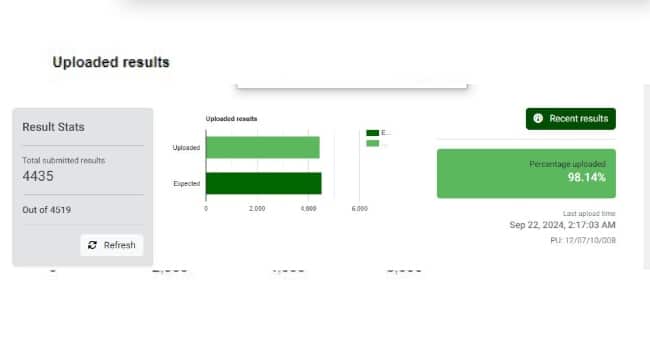Elections play a vital role in shaping the future of any nation, and the recent Edo State governorship election, held on Saturday, September 21, 2024, was no exception. Residents of Edo State took to the polls to elect a new governor, marking the end of Godwin Obaseki’s two-term tenure. With a competitive political landscape and a focus on transparency, the Independent National Electoral Commission (INEC) successfully uploaded over 98% of polling unit result sheets by 2:00 a.m. on Sunday, giving Nigerians an early glimpse into the outcome of this highly anticipated election.
INEC’s Role in Election Process
The Independent National Electoral Commission (INEC) is tasked with conducting free, fair, and credible elections across Nigeria. INEC’s role extends beyond just organizing elections—it also ensures transparency in the vote collation process. In the case of the Edo State election, INEC demonstrated its commitment to transparency by uploading results from polling units directly to its Result Viewing Portal (IReV), making the results accessible to the public in real-time.
Polling Unit Results Update
As of early Sunday morning, INEC had uploaded results from 4,435 out of the 4,519 polling units across Edo State, covering more than 98% of the polling unit results. This rapid upload reflects INEC’s dedication to providing accurate and timely election updates, keeping both the candidates and the public informed. While the final results are yet to be fully collated, this early access has allowed the public to follow the election process closely.
Overview of Edo State Governorship Election
The Edo State governorship election was held on September 21, 2024, with the primary objective of electing a new governor to succeed the incumbent, Godwin Obaseki, whose tenure will end on November 12, 2024. Edo is one of eight Nigerian states holding off-cycle governorship elections, alongside states like Anambra, Imo, and Bayelsa. The state boasts a voter registration list of 2,629,025 people, of which 2,249,780, or approximately 85.57%, are eligible to vote, having obtained their Permanent Voters’ Cards (PVCs).
Candidates in the Edo State Governorship Race
This year’s election saw a total of 17 candidates vying for the governorship position. However, the race has been largely characterized as a three-way contest among Asue Ighodalo of the Peoples Democratic Party (PDP), Monday Okpebholo of the All Progressives Congress (APC), and Olumide Akpata of the Labour Party (LP). Each of these candidates brought unique experiences and political backing to the table, making the election highly competitive.
Asue Ighodalo – PDP Candidate
Asue Ighodalo, representing the PDP, emerged as a strong contender for the governorship seat. A former chairman of the Nigerian Economic Summit Group, Ighodalo’s candidacy was further bolstered by the support of outgoing governor Godwin Obaseki. However, internal party dynamics, particularly the tension between Obaseki and his deputy, Philip Shaibu, added an interesting layer to the political landscape, potentially affecting Ighodalo’s campaign.
Monday Okpebholo – APC Candidate
Monday Okpebholo of the APC also positioned himself as a major candidate in the race. Backed by former Edo State governor Adams Oshiomhole and current deputy governor Philip Shaibu, Okpebholo’s campaign was rooted in the established political influence of the APC within Edo State. The backing of key political figures strengthened his bid, despite facing tough competition from the PDP and Labour Party.
Olumide Akpata – Labour Party Candidate
Olumide Akpata, a former president of the Nigerian Bar Association, ran on the Labour Party platform. Akpata gained significant support from the Obidient movement, led by the 2023 LP presidential candidate, Peter Obi. The movement had captured the attention of Nigerian voters, and Akpata’s association with it contributed to his growing popularity, particularly in Edo South, where the Labour Party holds strong.
Political Dynamics in Edo State
Edo State’s political landscape is divided among various regions and parties. While the APC holds influence in Edo North and Edo Central, the Labour Party maintains a strong presence in Edo South. This distribution of power highlights the state’s political diversity and the challenges faced by each candidate in securing widespread support.
The Importance of Permanent Voters’ Cards (PVCs)
INEC emphasized the need for eligible voters to obtain their Permanent Voters’ Cards (PVCs) ahead of the election. With 2,249,780 registered voters in possession of PVCs, representing 85.57% of the total electorate, voter participation was expected to be robust, reflecting the state’s engagement in the democratic process.
Voter Turnout and Participation
Voter turnout plays a crucial role in determining the outcome of elections. In Edo State, voter participation is traditionally strong, and this election was no exception. With a high percentage of eligible voters casting their ballots, the election results will reflect the will of the people and the state’s commitment to democracy.
INEC’s Use of Technology in Election Transparency
INEC’s decision to use technology, particularly the Result Viewing Portal (IReV), has revolutionized the election process in Nigeria. This platform allows voters and stakeholders to view polling unit results in real-time, ensuring transparency and reducing the risk of election fraud. The rapid upload of results from the Edo State election highlights the effectiveness of this technology in modern elections.
Challenges and Tensions in the Election
While the election was largely peaceful, underlying tensions between political figures influenced the race. The strained relationship between Governor Obaseki and his deputy, Shaibu, created internal friction within the PDP, which may have impacted the outcome of the election. Additionally, the support of prominent figures like Oshiomhole for the APC candidate added to the political intrigue.
What’s Next: Awaiting Final Results
As of now, Edo State awaits the final collation of results. With over 98% of polling unit results already uploaded, the remaining votes will determine the ultimate winner. INEC continues its efforts to ensure a transparent and credible election process, and all eyes remain on the commission’s final updates.
Conclusion
The Edo State governorship election is a testament to Nigeria’s evolving democratic process. With the involvement of technology, a competitive field of candidates, and strong voter participation, this election will shape the future of Edo State. As the state awaits the final results, one thing is certain: the voice of the people has been heard, and democracy is alive and well.


